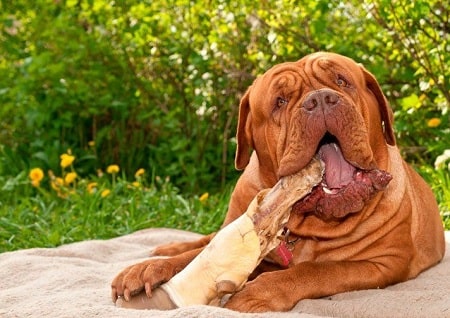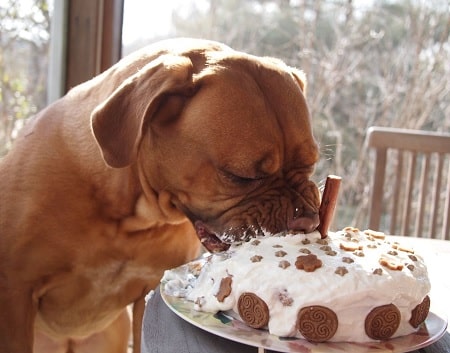Dogue de Bordeaux Diets
The Dogue de Bordeaux is a large-sized breed used for war and hunting from the ancient period even before France was France. It is a massive and powerful dog that weighs around 110 pounds. So, high-quality dog food with a balanced diet is essential for them to maintain a healthy lifestyle.
In this article, you’ll learn more about Dogue de Bordeaux diets alongside their feeding process on how much to feed them and what to feed them.
Diets
Protein: It is the most important ingredient you should take into consideration while choosing dog food. Large breeds like Bordeauxdog should be given 25-27% of the protein in their diet. It helps to supply amino acid that develops body’s tissue and cell regeneration.
Fats: Another nutrient to look after protein is fat as it contains fish oil that provides omega-3 fatty. It helps to develop the eyes and brain along with providing energy for movement. Around 5% of fat is enough for them to maintain their health and energy level.
Water: Water is very essential for them as they have breathing problems and heatstroke. They shouldn’t be exposed to high temperatures or intense exercise without drinking plenty of water. To clarify, make access to water throughout the day in a bowl near them every two hours.
How Much To Feed Your Dogue de Bordeaux?
The feeding process of French Mastiff depends on their age, weight, and activity level. As a newborn, feed 4 meals a day till they reach 8 weeks old. This time feeding is done by their mother so, you don’t have to be worried. However, if you’re raising a separated pup then feed milk from time to time. Then decrease the meal to 3 times a day till they are 2 months old.

Image Source: Pinterest
As they grow, limit their feeding to 2 times a day with some snacks and treats in between. Although there are times where they want more food hence, don’t hesitate to feed as an empty stomach can result in bloat/torsion in them. Avoid cooked bones and high-fat food. Moreover, watch their calorie consumption and weight as obesity is common for them. Additionally, feeding table scraps moderately is good for them
Dog Food For Dogue de Bordeaux
There are numerous options on what to feed a dog like a kibble, canned, home-cooked, and raw food. Choosing from these options totally depends on the master as well as what the dog prefers. Above all, your dog must get proper nutrition from whatever they eat. Meanwhile, here are some of the best dog food that can be fed to Bordeauxdog.
- Taste of the Wild High Prairie Formula
- Nom Nom Fresh Pet Food
- American Journey Beef & Sweet Potato Recipe
- True Acre Foods Beef & Vegetable Recipe
- Wellness Large Breed Complete Health Puppy
Supplements For Dogue de Bordeaux
Supplements have various benefits that help to boost essential nutrients in their body. It also increases absorption rate, improves coat and skin, maintains healthy digestion, and so on. However, if they are getting enough nutrients from their regular diet then supplements are not needed. Since their body is already getting nutrients, adding more of it can affect their health.
- Glucosamine
- Probiotics
- Fish Oil
- Antioxidants
Human Food Dogue de Bordeaux Can and Cannot Eat
Human diets and dog diets are two different things while the human overall diet results harmful to dogs. For instance, the food we humans consume is both safe and toxic for dogs. Thus, make sure to feed your dog from your plate. To be exact, below are some list of food that is good and harmful for your dog.
Can Eat
- Bread
- Cheese
- Corn
- Cake (limited without chocolate)

Image Source: Pinterest
- Egg
- Meat
- Fish
- Honey
- Peanut Butter
- Popcorn
Cannot Eat
- Cinnamon
- Chocolate
- Ice-cream
- Garlic
- Almond
- Onion
- Grapes and Raisins
- Avacado
- Coffee
Why Is Your Dogue de Bordeaux Not Eating?
In short, dogs go through several difficulties while growing up. They get sick and experience many changes around them. Some of the major reasons are mentioned below as why is your dog not eating anything.
Medical Reasons
- Digestion Problem (Can be seen eating grass)
- Worm and Bacterial infection
- Gastrointestinal Issues
- Hearing and Vision Loss
- Urinary tract infections
- Dental problem
Behavioral Reasons
- Change in environment
- Separation anxiety

Image Source: Pinterest
- Stress
- Interchange of normal routine
- Dislike the taste of food
Visit Doglime for more dog breed diets information.
Tags










